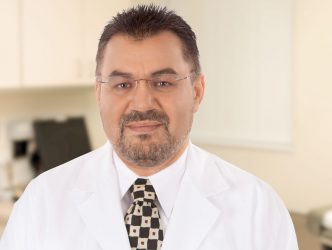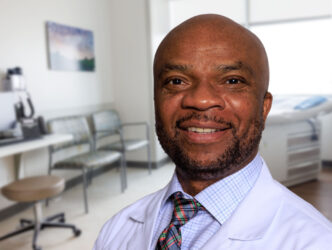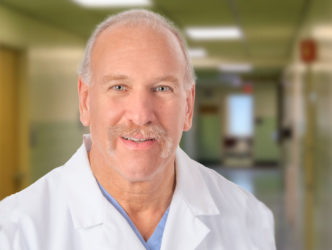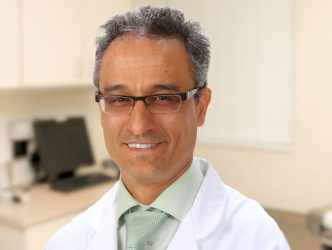
Earlier this year, the American Cancer Society announced their recommendation that screenings for colon and rectal cancers should start at age 45, rather than the previously recommended age of 50. The ACS stated that screening does not have to be a colonoscopy, specifically, but any of the other tests available, such as a home stool test, which can help detect signs of colorectal cancers.
Their recommendation comes from new information about the rise in colon and rectal cancer among younger adults.
“Over the past few years, nationwide, it turned out we were finding cancers in people of much younger age,” explained Edmundo Justino, MD, a gastroenterologist with Trinity Health. “Fifty years was the age we would start colonoscopies for adults with the average risk.”
By an average risk, that means someone who has no family history or polyps, he said. Patients who have a family history (a first-degree relative or two second-degree relatives) of colon cancer were encouraged to get screened before age 50.
Colon and rectal cancers increased 51 percent among adults under the age of 50 since 1994, the ACS stated. Most of the nation’s 140,000 annual cases – and 50,000 deaths – from colon and rectal cancer occur in those over the age of 55; however, the cases involving younger adults have risen to 29 percent for rectal cancer and 17 percent for colon cancer, studies show.
Additionally, the ACS estimated that in 2018, there would be 97,220 new cases of colon cancer and 43,030 new cases of rectal cancer. It is also estimated that there would be 50,630 deaths from colorectal cancer in the United States, making it the third leading cause of cancer-related deaths in men and women in the country. The death rate from colorectal cancer has decreased over the past several decades; the ACS notes that screening methods have detected colorectal polyps which are either removed before they develop into cancers, or are discovered in an earlier stage when the disease is easier to treat.
As Ira Paul Michaelson, MD, a gastroenterologist with Trinity Health, said, any screening test is a good test. Dr. Michaelson, who agrees with the new recommendation, said he has seen colon cancer strike in patients below the previously-recommended age. “I’ve certainly seen people below 50 – and as young as their twenties – with colon cancer,” he said. “It’s frightening.”
With screening, “We’re catching things and interrupting the progression. The total number of cases are down. The incidence is down. One segment of society is increasing in colon cancer: the under-50 population. That’s why the ACS came out with those recommendations.”
With the exceptions of things like genetic mutations, colon cancer is, for the majority, a preventable disease “if you do the things we recommend,” Dr. Justino said.
While the United States has a high rate of screening, there is no formally endorsed screening program, Dr. Michaelson said. “A lot of screening gets done because there are a lot of doctors who recommend it. The typical modes of screening are FIT testing, or fecal immunochemical test, which is a stool test for globin, and is a more sensitive test.”
Then there is the colonoscopy. “It’s not something that people think is as fun as going to the beach, but it does need to be done,” Dr. Michaelson noted.
Despite the notoriety of the colonoscopy, the procedure has reduced deaths from colorectal cancer by about 60 to 70 percent, the National Cancer Institute said. Additionally, polyps that are found during a colonoscopy can be removed almost immediately, while the FIT testing is used to detect the possibility of cancer. A positive FIT test would lead to a person getting a colonoscopy anyway.
Dr. Justino is also supportive of Cologuard, a noninvasive screening test that can be performed at home. “Cologuard is effective and recommended for people with no increased risk of colon cancer or polyps,” he said. “If you have a family history, you shouldn’t do Cologuard, but if you have no family history or polyps, get Cologuard.”
Cologuard screening also starts at age 45. Patients can get Cologuard from their primary care provider.
“Screening, by definition, is every 10 years, beginning at age 50 and going up to 75 or 80,” Dr. Michaelson said. “If the screening begins at 40, because of increased risk, then that is done every five years. If there is a situation of a family history of colorectal cancer, the exam is every five years, although at this point, it is technically not screening, but surveillance.”
For the average adult who has no family history or polyps and gets a clean bill of health from their first colonoscopy at age 45, another colonoscopy isn’t needed until they are 55 years of age.
“That is 10 years of peace of mind, not worrying about the possibility of colon cancer,” Dr. Justino said.
What can cause an increased risk of colorectal cancer? Being male, for one, Dr. Michaelson said, as well as having diabetes, smoking cigarettes, and being overweight (a body mass index over 30).
Colorectal cancer may not show any signs or symptoms. However, if symptoms do present, they can include: bleeding (“a very important symptom”), pain, or “a change in bowel habit,” which could mean an increase or decrease in bowel movements, Dr. Michaelson explained.
Blood can be seen in the stool or make it look darker, but often the stool looks normal, the ACS said. “Sometimes, the first sign of colorectal cancer is a blood test showing a low red blood cell count,” according to their website. This is because over time, the blood loss can build up and lead to low red blood cell counts, or anemia.
If you show signs of colon or rectal cancer, and/or would like to schedule a colonoscopy, contact your local gastroenterologist. Patients will need a referral and an order for a colonoscopy from their primary care provider. Patients should also check their insurance to see if colonoscopies are covered.
“But do something,” Dr. Justino said. “Because this is preventable, and it kills people.”
Trinity Health’s Gastroenterology department includes Rukshana Cader, MD; Edmundo Justino, MD; Ira Paul Michaelson, MD; Kelly Dickinson, FNP-C; and Bonnie Ler, FNP-C. Their offices are located at Health Center – Medical Arts, 400 Burdick Expressway E, Minot. For appointments or consultations, please call 857-7389.



